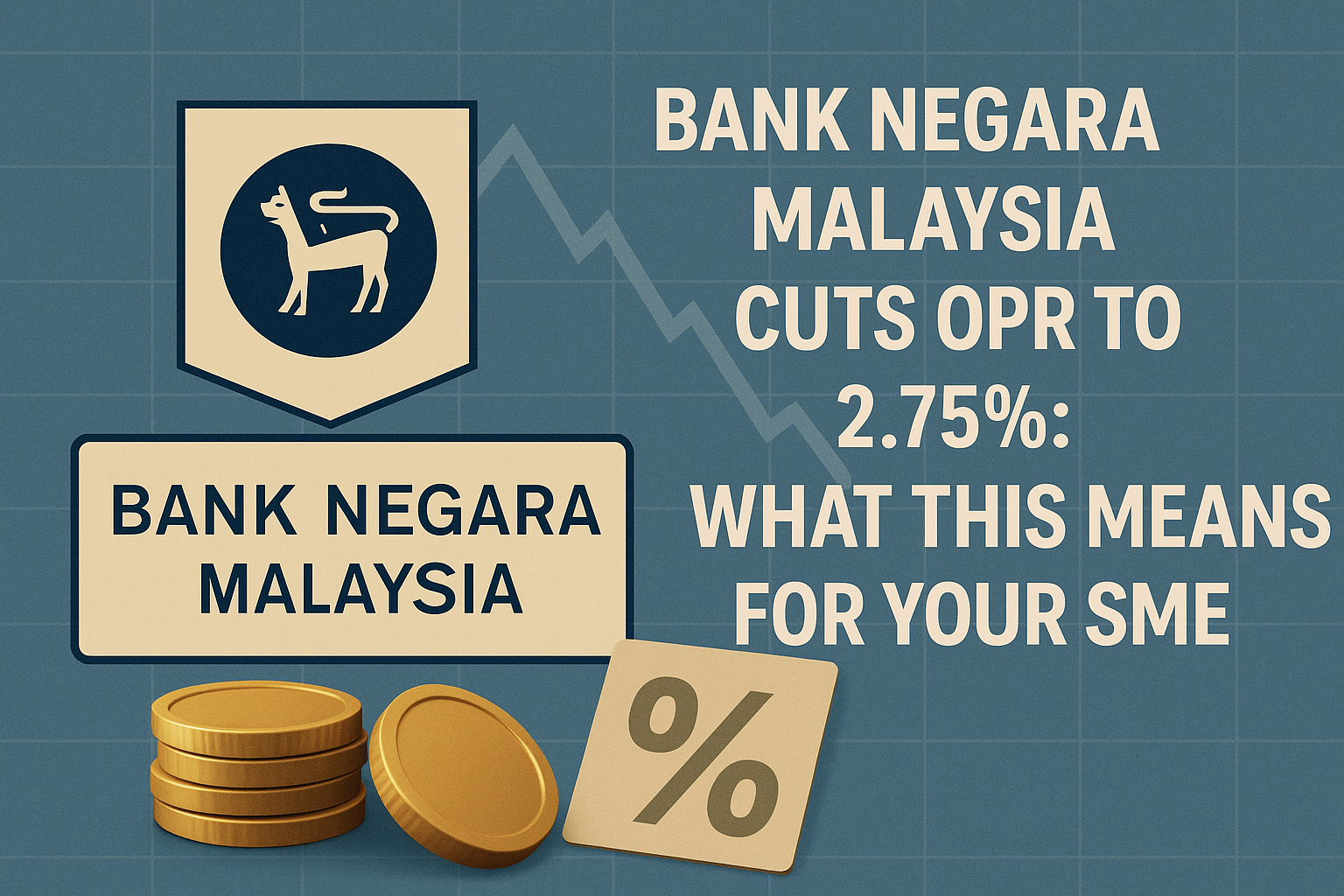In a pre-emptive move to safeguard economic growth amid global uncertainties, Bank Negara Malaysia’s (BNM) Monetary Policy Committee (MPC) has announced a reduction in the Overnight Policy Rate (OPR) by 25 basis points, bringing it down to 2.75%.
This decision, announced on July 9, 2025, directly influences the interest rates offered by commercial banks and has significant implications for businesses across the country. For Small and Medium Enterprises (SMEs), this rate cut can affect everything from the cost of financing to consumer spending patterns. This guide will break down what this OPR cut means for your business and how you can strategically respond.
Why Did BNM Cut the Interest Rate?
According to BNM’s official statement, this rate cut is a “pre-emptive measure”. While the domestic economy remains on a strong footing, supported by resilient household spending and ongoing investment projects, there are growing risks from the global environment.
The key reasons for the cut are:
- Global Economic Headwinds: Uncertainties surrounding international trade, potential tariffs, and geopolitical tensions are creating risks to global growth, which could impact Malaysia’s export-oriented economy.
- Moderate Inflation: With inflation currently under control, BNM has the flexibility to focus on supporting growth without worrying about triggering excessive price increases.
- Preserving Growth Momentum: By making it cheaper to borrow money, the central bank aims to encourage investment and spending, thereby preserving Malaysia’s steady economic growth path.
What a Lower OPR Means for Your Business
Following BNM’s decision, major commercial banks like CIMB have already announced corresponding reductions in their lending rates, which will take effect in the coming days. Here’s how this will impact your SME:
1. Cheaper Business Loans & Financing This is the most direct benefit. The cost of borrowing will become lower.
- Existing Variable-Rate Loans: If you have existing business loans with a variable interest rate, you can expect your monthly repayment amount to decrease slightly.
- New Financing: If you are planning to apply for a loan to expand your business, purchase new machinery, or increase your working capital, now is a more advantageous time to do so. The lower interest rate reduces the overall cost of the financing.
2. Potential Boost in Consumer Spending Lower interest rates also affect consumers. For individuals with variable-rate housing or car loans, their disposable income may increase slightly. This can lead to a potential, albeit modest, boost in overall consumer spending, which is good news for B2C businesses.
3. A Good Time to Review Your Financial Strategy A change in the interest rate environment is the perfect trigger to review your company’s financial strategy.
- Debt Restructuring: Is it a good time to refinance an existing, higher-rate loan to take advantage of the lower rates?
- Investment Opportunities: Does the lower cost of capital make a new investment project (e.g., in digitalization or new equipment) more financially viable?
How SMONE Can Help You Capitalize on This Change
To make the most of a lower-interest-rate environment, you need a clear and accurate picture of your company’s financial health.
At SMONE, our professional financial services are designed to give you this clarity.
- Our Financial Reporting & Analysis can help you develop robust cash flow projections to support a new loan application.
- Our Accounting & Bookkeeping service ensures you have the clean, credible financial statements that banks require.
- We can help you conduct a “what-if” analysis to see how new financing could impact your profitability and growth plans.
Don’t let this strategic opportunity pass. Contact us today to discuss how you can leverage the new interest rate environment to your advantage.
(Disclaimer)
This article is for general informational purposes and is based on recent public announcements from Bank Negara Malaysia and other financial institutions. It does not constitute financial advice. Please consult with a qualified financial advisor for advice tailored to your specific situation.


